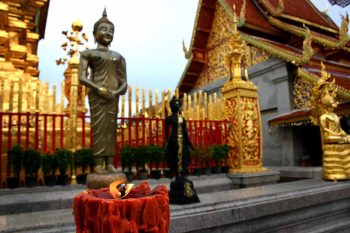Take the Plunge – My Experience Teaching in China
When a person looks back at their life there are certain watershed moments. Moments that mark a distinct change in life direction, in character development; a moment personal and professional avenues for future development opened. The decision to teach abroad in China can be one of those moments. It certainly was for me and—from where I’m sitting right now—I would do it all the same again.
There is, however, a reason this article is titled Take the Plunge. This type of decision, especially when you’re is standing just at the edge of the precipice, ready to jump or step back, can feel a lot like the edge of a cliff. Well, in a way it is, but may I remind you many perfectly sane and reasonable people jump off cliffs for fun. They just make sure they have the proper training and equipment and know what is waiting for them over the edge.
I’ve taken the plunge in four separate nations on two continents. In this article, I’ll try to provide you with what experience I’ve gained in the process and a peek over that cliff’s edge to see what awaits (it’s more calm water than jagged rocks, by the way).
The first thing many consider when weighing their options is the sense of cultural butterflies and those unknown “other people and their ways.” So—
How Different Is Everyday Life?
This is one of the most common questions I get when I visit “home” and the emphasis is always on the word different. Or, it’s sometimes put more simply as “What is life like over there?”
I’ve lived on three of the five habitable continents so far in my travels, and this question always gives me pause. The day-to-day lives and rhythms of cultures and people the world-over have more in sync with one another than out of step.
For the most part, people want the same things, that old Maslow’s hierarchy. They want a roof over their heads, a way to make money, something to eat, and someone to love. From Shanghai to Guadalajara and in most every society in between, you’ll find more or less the same daily routine with the details and the methods of the culture and people providing that unique flare.
In Vietnam, for example, it’s considered normal to get up around 5:00am and take a nap from 11am until about 1pm. In China (depending on the region), you may be eating miàntiáo (面条), a spicy dry wheat noodle dish, or congee with various meats (that you may or may not be able to identify) instead of eggs or cereal, but rest assured you’ll be up and having breakfast.

There are still important cultural differences in, say, the roles played in family relationships or how to speak to supervisors in the workplace, but the mainstays of life are more or less universal. And, as for the intricacies, locals will give you a sort of “foreigner pass” on social etiquette—that is until they know you’ve been in the country long enough to know better.
You won’t arrive in China at a complete loss for your daily rhythm or unable to find toothpaste, soap, and the other necessities of life at the local Wu Mart or Walmart Supercenter.

How Can I Communicate When I Can’t Even Read?
This is another huge concern people have before embarking on the journey to teach abroad, especially in nations like China that use not only a different language, but a different script, and an entirely different tonal pronunciation system. You’d be amazed what you can communicate with a little openness, practice, and faith in the shared human experience.
These situations always remind me of my first time abroad in Prague. The rain is pouring in sheets and I’m hiding out under a tree across from a street of shops: pharmacy (no help), electronics (no luck, again), and a store counter with cigarettes, candy, and beer. I figured the last was my best bet and jogged over.
I spoke not a word of Czech and the old woman behind the counter, no English. All it took was an open hand gesture to the rain outside and tracing a dome over my head—her look of sudden recognition and she started pulling out umbrellas. She fumbled in the register and showed me the kroner bills and coins to indicate the cost. I matched them and strolled out of the shop bone dry in a downpour. We hadn’t said a word to each other.

It never occurred to me how linguistically and conceptually simple most of our day-to-day interactions (shopping, taxis, subways, etc.) are or how easy it is to get by on context alone. If you show up to a motorbike repair shop with a flat tire, not much language is needed other than to indicate the problem and agree on a price (pen and paper). Not to mention that when you’re totally immersed in the language and culture, you’ll begin to pick up numbers, simple phrases (“how much?” “I want _______,” “Do you have __________?” etc.) in a month or so tops.
Is it Possible to Make Good Money and Save It?
The short answer is yes, and yes with a few caveats. One of the most important factors in landing a well-paying English teaching gig in China is some sort of professional certification (TEFL, CELTA etc.). The days of showing up in Asia with a backpack, native English, good intentions, and expecting to land a cushy job have long since passed with the hair-metal of the 80s. That’s not to say it’s impossible to find work without credentials, but rather that the best positions require them as a prerequisite.
The proliferation of teaching certificates sanctioned by international bodies has allowed schools worldwide to sort the wheat from the chaff with very little effort. These certifications are more than a foot in the door. They prove you have already been vetted and sanctioned to teach by some sort of authority on the matter.

A TEFL certification can be earned online, in-person in your home country, or sometimes in the major cities of your new nation of residence. Certification can be completed in a month (intensive) or three to six months at a more gradual pace, depending on your circumstances. One of these certifications can net you a salary between 10,000 to 13,000 RMB per month, between $1,500 and $2,000.
The second caveat just comes down to you and the lifestyle you wish to live. The average yearly wage in China is 56,380 RMB ($8,655) per year, granted this is the aggregate for the country (Bloomberg.com). So while $24,000 per year income in your home country may not seem like much, in China that money can go a long way. A domestic beer costs 5RMB and a Coca-Cola 3RMB. An apartment in the city center would run about 3,500 RMB, in the big cities, and much less in the smaller ones. That means your teaching salary can put you in the comfortable level of upper middle class Chinese society.
Now, I’ve seen foreign teachers go one of two ways with their newfound financial comfort zone. Some get a fancy apartment in one of the high-end neighborhoods, spend weekends partying, and buying bottles to rub shoulders with the upper crust of the Chinese nightlife crowd. This is all well and good and I would be remiss to say that I didn’t engage in some behavior like this myself on any given weekend. It’s a lot of fun, after all.

However, this is not the best way to manage and save your assets. The smarter avenue financially is to set yourself up with relatively nice local-style apartment at about half the cost or less of an upscale place. Ideally this would be close to your school or university to cut down on transport costs. On a daily basis, eat and drink like the locals do, in markets and little roadside bars.

You’ll be amazed to watch your bank balance grow with each passing month, and you can really stack up quite a good amount of savings over a year or two. If you manage to find a good roommate or get lucky with a girlfriend/boyfriend who you’d consider living with, well, saving doubled over again—more than enough to splurge on that semester break trip to the tropical island of your choosing in SE Asia, the mountains of Nepal, or the majestic spires and carvings of Angor Wat.

So Is It Worth It?
From my end, I can say without reservation the choice to teach abroad expanded my life and professional experiences in ways unimaginable if I’d remained stateside. While not everyday is a walk in the park in any country, the decision to expatriate can often be fraught with some of the unfounded worries I’ve mentioned above.
If you’re considering a change of scenery, career, culture, and lifestyle, teaching in China presents both profitable and enjoyable options. The land is diverse and home to more natural and ancient wonders than can be listed in a single article.
If any of the concerns above have been holding you back from sending those applications or booking tickets, rest assured that life is life all over. While it may look different in China at first, acclimation is relatively easy with an open mind and a relaxed attitude.
